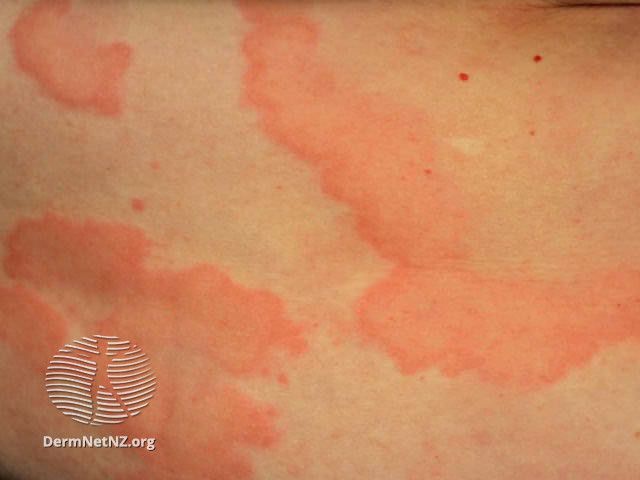- Case-Based Roundtable
- General Dermatology
- Eczema
- Chronic Hand Eczema
- Alopecia
- Aesthetics
- Vitiligo
- COVID-19
- Actinic Keratosis
- Precision Medicine and Biologics
- Rare Disease
- Wound Care
- Rosacea
- Psoriasis
- Psoriatic Arthritis
- Atopic Dermatitis
- Melasma
- NP and PA
- Skin Cancer
- Hidradenitis Suppurativa
- Drug Watch
- Pigmentary Disorders
- Acne
- Pediatric Dermatology
- Practice Management
- Prurigo Nodularis
- Buy-and-Bill
News
Article
Remibrutinib Improves Chronic Spontaneous Urticaria Symptoms at Week 2
Author(s):
Data from Novartis will be presented at the 2023 American College of Allergy, Asthma, and Immunology Scientific Meeting.
Novartis recently announced new findings from the phase 3 REMIX-1 (NCT05030311) and REMIX-2 trials (NCT05032157) evaluating remibrutinib, an oral Bruton’s tyrosine kinase (BTK) inhibitor, for the treatment of chronic spontaneous urticaria (CSU). Remibrutinib demonstrated significant efficacy in alleviating CSU symptoms as early as week 2, marking a pivotal advancement in addressing the unmet needs of patients unresponsive to H1-antihistamines.
The pivotal phase 3 trials confirmed remibrutinib's potential, displaying notable reductions in urticaria activity compared to placebo. Remibrutinib facilitated substantial and statistically significant improvements in symptom control, starting as early as week 2 and persisting up to week 12. Overall, remibrutinib’s results suggest a potential sustained relief from the burdensome symptoms experienced by patients with CSU.
The results from the REMIX trials underscore remibrutinib’s superiority in diminishing weekly urticaria activity (UAS7), itch (ISS7), and hives (HSS7) when compared to the placebo at week 12. A significant proportion of patients achieved well-controlled disease (UAS7≤6) as early as week 2, a response that was maintained at week 12. Notably, approximately one-third of patients experienced complete absence of itch and hives by week 12.
According to the results, “Remibrutinib demonstrated a well-tolerated and favorable safety profile, with overall adverse event rates that were comparable to placebo (64.0% in remibrutinib vs 64.7% in placebo), including infections (32.8% in remibrutinib vs 34.0% in placebo) and liver function test abnormalities. Liver transaminase elevations were balanced across both treatment groups (remibrutinib and placebo), asymptomatic, transient and reversible.”
CSU, a condition characterized by persistent hives lasting over 6 weeks, often stems from internal factors rather than external triggers. In this context, BTK plays a significant role in the pathway leading to histamine release and debilitating symptoms. Remibrutinib’s mechanism involves blocking BTK, thereby preventing the release of histamine responsible for the distressing hives and tissue swelling associated with CSU.
“Patients with CSU have limited treatment options and many patients do not respond to antihistamines even at higher than approved doses, leaving them with uncontrolled symptoms and potential side effects such as drowsiness,” said Angelika Jahreis, Global Head of the Development Unit of Immunology at Novartis, in the press release. “We are committed to developing new therapies for patients with immuno-dermatologic disorders and are excited about the prospect to provide a potential new option for patients with CSU who suffer from relentless itch and a life filled with limitations. These data show that remibrutinib, an oral BTKi, provided significant symptom improvement as early as week 2 and sustained up to week 12.”
The REMIX-1 and REMIX-2 trials are ongoing, with participants receiving treatment for up to 52 weeks. The positive outcomes of these trials have set the stage for future regulatory submissions in 2024, aiming to introduce remibrutinib as a potential solution for CSU patients with limited treatment options. If approved, this highly selective BTK inhibitor could offer a transformative oral treatment option for patients with CSU.
Reference
Novartis data show potential of remibrutinib as an oral treatment for chronic spontaneous urticaria providing significant symptom improvement as early as week 2. Novartis. Press release. November 9, 2023. Accessed November 9, 2023. https://www.novartis.com/news/media-releases/novartis-data-show-potential-remibrutinib-oral-treatment-chronic-spontaneous-urticaria-providing-significant-symptom-improvement-early-week-2







